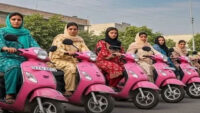30th November 2020: A Singaporean woman who contracted the coronavirus has given birth to a baby with antibodies against the virus.
According to reports, doctors in Singapore are studying the impact of COVID-19 on unborn babies, when an infected mother delivered an infant earlier this month who had antibodies against the virus but did not carry the disease.
The ongoing study among the city-state’s public hospitals adds to international efforts to better understand whether the infection or antibodies can be transferred during pregnancy and if the latter offers an effective shield against the virus.
The Singaporean woman told the local newspaper the Straits Times that doctors said her infant son had antibodies against the virus but was born without the infection.
“It is still unknown whether the presence of these antibodies in a newborn baby confers a degree of protection against Covid-19 infection, much less the duration of protection,” said Tan Hak Koon, chairman of the Obstetrics and Gynaecology division at KK Women’s and Children’s Hospital.
KK is one of the hospitals involved in the study of infected pregnant women in Singapore, details of which surfaced after the case of the baby born with antibodies was made public.
The World Health Organisation says while some pregnant women have an increased risk of developing severe COVID-19, it is not yet known whether an infected pregnant woman can pass the virus to her fetus or baby during pregnancy or delivery.
According to an article published in October in the journal ‘Emerging Infectious Diseases’, doctors in China reported the detection and decline over time of COVID-19 antibodies in babies born to women with the coronavirus disease.
However, according to research published in the ‘Nature’ journal in October, there is evidence that transmission during pregnancy is rare, while, a small study in Italy suggested that it is possible.
Other studies have shown that COVID-19 antibodies can be passed to a child through breastfeeding, while KK Tan said there was evidence they could pass during pregnancy through the placenta to the baby.
Paul Tambyah, one of Singapore’s leading disease experts, said it was encouraging that antibodies were present in the baby months after the mother’s infection, adding to broader evidence that they offer some protection from the virus.
“Worldwide there have been millions of people infected, including probably thousands of pregnant women, with very few reports of infections in very young babies. This suggests that there might be some protection from maternal antibodies and breastfeeding,” said Tambyah, President of the Asia Pacific Society of Clinical Microbiology and Infection.
Stay tuned to Baaghi TV for interesting news and updates!






